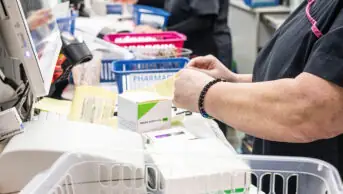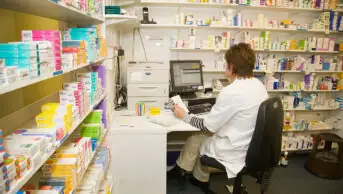
Shutterstock.com
Health Education England (HEE) is looking for providers to train up to 210 specialist mental health pharmacists over the next three years, a contract tender has shown.
The tender, published on 28 October 2022, says recruitment of pharmacists on to the training course is expected to start in January 2023 with 70 places available in the first year. The training will then begin “no later than March 2023”.
Training providers are being offered up to £4,000 per place to provide the specialist training to pharmacists who are already working within a community or primary care mental health care setting.
Another 70 places will be funded in 2023/2024, with the potential for a one-year extension to train another 70 pharmacists, the document said.
Pharmacists completing the training will be embedded in a multidisciplinary team in community mental healthcare for patients with severe mental illness and they will be responsible for medicines optimisation, particularly for those with complex comorbidities.
The training is part of plans to give 370,000 adults and older adults with severe mental illnesses “greater choice and control over their care” by 2023/2024, the document said.
A pilot programme to train the first specialist mental health pharmacists began at the University of Bradford in April 2022 with 50 placements.
Ten online learning modules are included in the pilot scheme, which was open to participants from a variety of backgrounds within the pharmacy profession.
Plans to train mental health pharmacists were first announced in NHS England’s ‘NHS people plan’, published on 30 July 2020, as part of a wider drive to prioritise “continued investment in training the future mental health workforce”.
Those applying to provide training must show how delivery of the training pathway will be carried out nationally, while ensuring equity of access across all HEE regions.
Gemma Quinn, lead for postgraduate taught clinical programmes in the School of Pharmacy and Medical Sciences at the University of Bradford, said they had been doing an ongoing evaluation but HEE had also commissioned an independent evaluation before announcing the tender, which her team would apply for.
“They obviously think it’s been a useful programme,” she said. The course is online learning but taking a team-based approach, which had been helpful for the pharmacists to create a community rather than just working through modules on their own and to prepare them for the team working they would have to do in these roles, she explained.
She added that this was a vital role for a pharmacist to be involved in and those on their training programme had a variety of backgrounds, although most were now working in community mental health care at least some of the time.
The patients they will be managing will have complex medical needs and a range of other comorbidities, she said.
“Having a pharmacist on the team means patients will get better care but also pharmacists’ worth will be obvious to everyone else working on that team.”
Shane Costigan, regional head of pharmacy for the south east at HEE, said the contract is “part of HEE’s continued investment in training the future mental health workforce and expanding education and training posts for the future workforce”.
“This tender is for the second cohort of the pathway to support the development of community-based specialist mental health pharmacists, and will be launched in spring 2023 for up to 70 learners.
“This investment is in line with the [ambition in the] ‘NHS long-term plan’ and ‘NHS people plan’ to develop integrated models of primary and community mental health care, to support adults and older adults with severe mental illnesses.”


